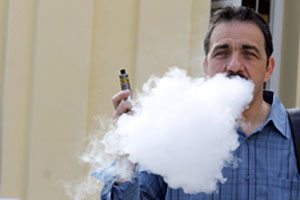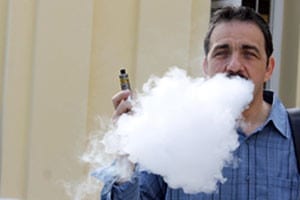Gcoyi: South Africa Needs Fair Vapor Regulations
- News This Week opinion
- November 3, 2020
- 8 minutes read

The hype of the past few years around nicotine delivery systems such as vapes and e-cigarettes has overshadowed the fact that it is inhaling smoke from burning tobacco, not nicotine, that causes most smoking-related cancers.
Electronic vapour products (EVPs) were developed as a tobacco harm reduction tool and offer an alternative way to consume nicotine without the smoke produced through the burning of tobacco.
Hype and ignorance about EVPs persists, however, even among those involved in public health legislation. This is despite increasing international research in support of EVPs.
A letter from the U.S. office of the attorney general in the Iowa department of justice to the U.S. Food and Drug Administration’s (FDA) director of the Center for Tobacco Products in March 2020 addressed an erroneous FDA statement suggesting that smoking and vaping posed an equal risk to users during the Covid-19 pandemic. It said: “If the FDA is able to provide candid and clear advice that puts the health of millions of Americans first, and this is based on sound behavioural and biomedical insights, then it should do so. If, however, its communications are arbitrary and ill-conceived, spreading fear and confusions with little scientific basis and with unpredictable consequences, then it would be better if the FDA and its media spokespeople did not comment further at this time.”
The letter challenging the FDA was signed by the attorney general and 12 academics and researchers in public health from across the US, Canada and the European Union. Many have acted as consultants to governments during the drafting of legislation around non-combustible nicotine delivery systems. Among them are a number from institutions in the United Kingdom, a global leader in harm reduction policy, and where innovation in the vaping sector has flourished.
The UK now stands as the gold standard for how it regulates, manufactures and sells EVPs. Organisations such as the United Kingdom Vaping Industry Association (UKVIA) are also gaining attention for its position on the critical role that regulation has to play in finding a solution that enshrines both public safety and private entrepreneurship.
South Africa would be wise to follow suit if we are seeking sensible resolutions to the debate around the regulation of EVPs in our own country – and if we are to secure the best possible outcomes in the fight against diseases such as lung cancer and emphysema.
The first steps entail raising the level of understanding among politicians and lawmakers that combustible tobacco products and EVPs are not the same. They should not even share the same legislative platform. To insist that they do will remove an option from millions of South African smokers who are seeking harm-reduced alternatives to cigarettes.
Until the Covid-19 lockdown began in South Africa, EVPs were not legislated in terms of either the Tobacco Products Control Act or the Medicines Act.
That all changed when EVPs were subjected to the same unilateral ban as tobacco products under lockdown. Now, the imminent new Control of Tobacco and Electronic Nicotine Delivery Systems Bill looks to do exactly the same thing: classify nicotine-delivery systems and combustible tobacco products identically – from packaging and the same health warnings to restrictions on all possible distribution and public awareness channels, including advertising.
The problem with such a course of action, advises UKVIA director John Dunne, is that when consumers feel their options are constrained, they look for shortcuts and loopholes. The hard lockdown was evidence of exactly that when black market cigarette sales soared.
Dunne believes the regulatory landscape is at a pivotal point now, with two opposing factions in the ring. One is bent on demonising the consumption of nicotine at all costs, while the other aims to promote vaping as a harm-reduced alternative to smoking. Speaking at a recent VPASA webinar on EVP policy and regulation, Dunne was frank in admitting that nothing we do is 100% safe, but warned that reasonable access, advertising and education are all critical in the creation of successful regulation.
South Africa’s goals are not that far from the UK’s own and, according to Dunne, “the ultimate prize would be regulations that would prevent youth access, but also allow us to reach the adult smoker”.
“It’s really difficult with existing regulations to make that connection with smokers to get them across the line to do something different. But a smoker made to feel like they have options in 2020 is really valuable,” he commented.
At the same webinar, medical doctor and president of the Philippines-based anti-smoking advocacy group Quit for Good, Dr Lorenzo Mata, outlined the role his group had played in that country, shifting the narrative from a complete ban on EVPs to pending regulation in its favour – in just six months. Mata noted that Quit for Good, comprising concerned citizens who recognise the profound damage and loss that cigarettes have brought to that country, were pursuing legislation that enabled citizens to make the best choices for their own health.
“It’s for this reason that we have been at the forefront of advocating for vaping – both in terms of educating the public and in making ongoing representations to our government,” he said.
“Collectively, with the support of other groups also concerned with public health, we have helped to shape a stable and favourable regulatory framework for EVPs, where regulators now intend to regulate EVPs, most importantly, in a risk-proportionate manner relative to cigarettes.”
To be at its most effective, legislation must first interrogate the principles of relative risk and proportionate regulation. If we can convince the South African government to ask those same questions and conduct a full review of all the harms and benefits of specific products such as EVPs, it will be possible for policymakers to reach a science-based conclusion that is in the best interests of all South Africans.
Asanda Gcoyi is the CEO of the Vapour Products Association of South Africa (VPASA). The views expressed are those of the author and do not reflect the official policy or position of Vapor Voice. This opinion first appeared in the Mail & Guardian.
